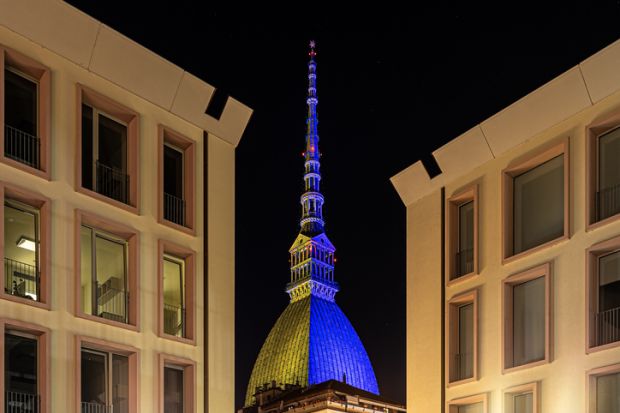Russia’s invasion of Ukraine has provoked unprecedented action from governments worldwide, but while many education ministries and university associations have spoken out in support of their Ukrainian colleagues, there has been less consensus about how academic relations with Russia should change.
A day after the invasion began, the German Ministry of Education and Research said its “long-standing cooperation” with Russia would be “halted immediately”, calling the attack “a grave breach of international law” that demanded “serious consequences”.
Following the German example, Denmark’s education minister, Jesper Petersen, wrote to universities urging them to “suspend any research and innovation cooperation” with institutions in Russia and Belarus and to refrain from any new exchanges.
The European Commission has said it will not sign any new contracts or agreements with Russian organisations for EU programmes. A spokesperson said officials would also review all current projects under Horizon 2020 and Horizon Europe and that in the meantime it would make no payments to Russian entities.
Many other countries had already begun to wind down their cooperation with Russia. Latvia’s education minister, Anita Muižniece, told Times Higher Education that Russia had previously been “among the largest research partners” for Latvia, but that collaborations had been declining in recent years. Latvia’s remaining cooperation with the country was mostly through European Union programmes or large-scale research consortia such as Cern, she explained, and the scant bilateral projects with Russia were minor, such as postdoctoral positions. Latvian institutions have been “strongly urged” to end even those relationships.
In Lithuania, where universities have also been asked by the ministry to cut ties, the rector of Vilnius University, Rimvydas Petrauskas, said his institution would “never impose sanctions on the nationality of students or teachers”. Professor Petrauskas warned of false reports that Russian citizens were being expelled from European universities, describing these as efforts to divert attention from Russia’s military aggression.
In contrast, some have called on academic ties to be preserved as an aid to peacemaking. The rectors’ conferences of Belgium’s Dutch- and French-speaking regions issued a joint statement asking all governments to “make sure that academic cooperation can continue as much as possible, as it allows the free flow of thoughts even during the darkest hours of armed conflict”.
Sinead O’Gorman, director of the European arm of the charity Scholars at Risk, said that while a temporary suspension of cooperation in some fields “might be warranted”, the impact on individual scholars had to be considered, “especially those who are actively speaking out about the Russian invasion of Ukraine and may face backlash themselves for doing so”.
Academics have been among the thousands of Russians who have risked arrest protesting against the war, with some telling THE that they hoped overseas colleagues understood that a significant number of Russians opposed the conflict.
While acknowledging an open letter signed by thousands of Russian scientists opposing the war, the rectors’ conference of Estonia expressed “regret” that institutions in Belarus and Russia had been “silent on this issue”. Latvian rectors called on Russia’s “progressive academic community to take a clear and firm stand” against the invasion.
Many governments are offering scholarships and services to those scattered by the war. The French Pause programme, which is backed by the Education Ministry, has opened a dedicated call for Ukrainian researchers. In Germany, the Philipp Schwartz Initiative for endangered scientists has extended the deadline on its current call.
Help has also come from Ukraine’s immediate neighbours and those with histories of Soviet domination. In a letter to rectors, Poland’s education minister, Przemysław Czarnek, said the ministry said would allow fleeing students’ exams results and internships to be recognised, invoking a mutual recognition agreement with Ukraine. Mr Czarnek said he would also “consider” a new scholarship programme for Ukrainians and the universities that host them.
The Czech Ministry of Education has set aside Kc150 million (£4.9 million) for Ukrainian scholarships, enough to cover a year of tuition costs for 1,000 students. In a letter seeking to reassure the more than 4,000 Ukrainians already studying in the country, Petr Gazdík, the minister for education, referred to the “similar situations” the Czech Republic had experienced in the 20th century.
After a video call with their Ukrainian counterpart, Serhiy Škarlet, the education ministers of Estonia, Latvia and Lithuania issued a joint statement calling on EU education ministers to offer “all the necessary assistance” to Ukraine.
Ms O’Gorman said Scholars at Risk had so far received fewer than 10 applications from academics in Ukraine, noting that this was likely because of a bar on men of fighting age leaving the country and Ukrainians’ visa-free travel into the EU.
Register to continue
Why register?
- Registration is free and only takes a moment
- Once registered, you can read 3 articles a month
- Sign up for our newsletter
Subscribe
Or subscribe for unlimited access to:
- Unlimited access to news, views, insights & reviews
- Digital editions
- Digital access to THE’s university and college rankings analysis
Already registered or a current subscriber? Login








